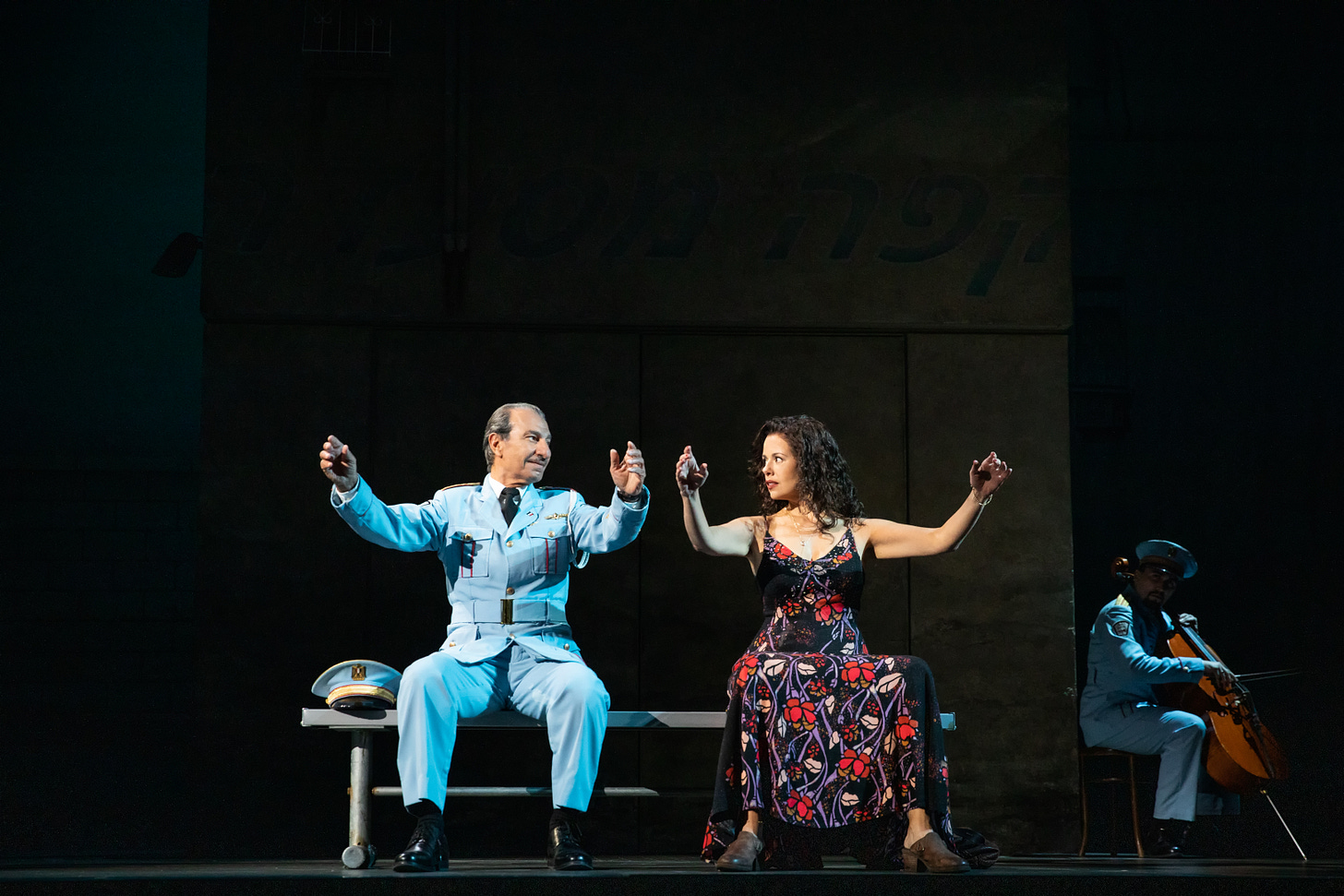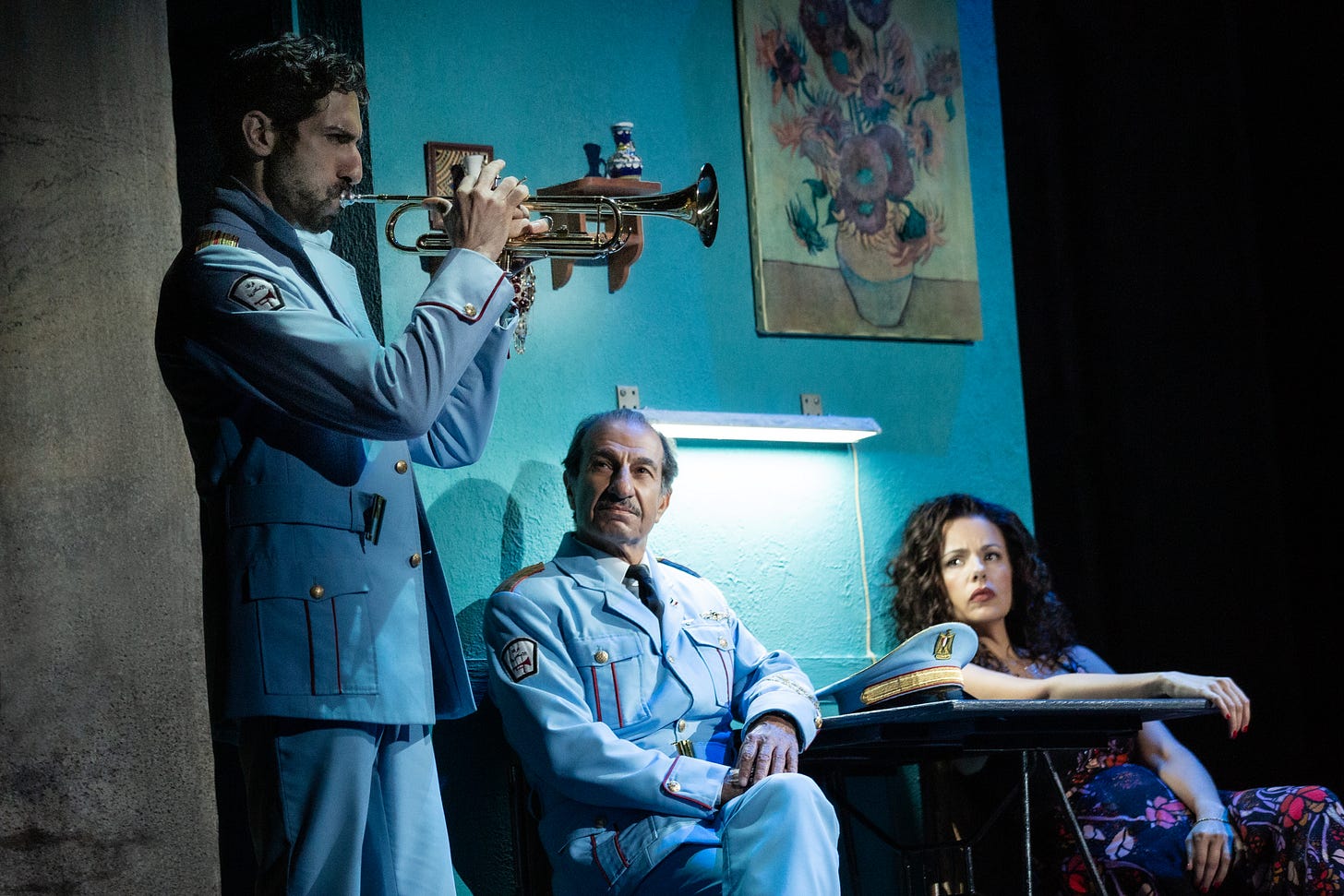But First
This week on While You Were Sleeping in Hebrew School, I talk (again) with Maksim Goldenshteyn about Ukraine’s Jewish history and the complicated impact of the Soviet Union on Jewish identity. Listen here.
“We realized that we have really something special in our hands.”
The Band’s Visit, the award-winning 2007 Israeli film about an Egyptian band that gets stranded in the middle of nowhere, Israel, and was later adapted as a Tony-winning musical, comes to The Paramount next week.
Sasson Gabay, the versatile Israeli actor (see him in Rambo III) who plays the lead part of Tewfiq both on film and stage talks about why the quiet, poetic story has such staying power.

Tell me a little bit about your early life and how you got into acting.
I was born in Baghdad, Iraq, and when I was three years old, we immigrated as most of the Jewish community in Iraq did in 1951. Most of the population immigrated as one because they started to suffer from discrimination. I don’t remember Baghdad, but I do know the language. We immigrated to Israel, and we lived in Haifa. I grew up there. My father was a successful merchant in Baghdad in the textile business, but he came to Israel and, you know, when people came from Iraq to Israel, they had to give up the Iraqi passport. All the properties had been confiscated. My father had a grocery in Haifa. I grew up in Haifa, and my culture is really mixed. At home we spoke Iraqi Jewish. It’s not Iraqi Arabic, but Jewish Iraqi Arabic. So it’s a little bit different, but it’s basically Arabic. I assimilated very quickly to the new culture, to Israel, to Hebrew. I was going to kindergarten in Israel. Our culture was mixed of the Iraqi origin and this the new Israeli culture, which is Hebrew — Israeli songs and openness to classical music. I’m grateful for that, because this gave me openness, as as human being and as an artist also.
I was quite a shy boy. I remember as a child of 9 or 10 years old, I’ve done some sketch at school. And all of a sudden, I felt good. I felt free. I felt like I’m in my own water. It was kind of a good place for me to be emotionally. Since then, I started to be interested in acting and in theater. At the time we didn’t have enough money to go to shows, to buy tickets. So there were plays on the radio. I remember myself as a kid listening to the old classics. My imagination worked even more. And then I went to see shows, and it was my secret dream to be an actor. I didn’t want to reveal it, because it was quite exceptional in our community and our family. For the army service, I tried to audition for an entertainment group, and I wasn’t accepted. I was very disappointed, but still the dream to be an actor and my interest in acting and theater was great.
So when I finished my army service, I auditioned at Tel Aviv University for the drama department and was accepted. I wasn’t sure that I belonged to the profession, so I studied theater and psychology, because I’m interested in people. I thought, maybe I’m fantasizing only, and it’s only on my imagination, but very quickly I got feedback from teachers, and I felt that I belong to this profession. And since then, I’m doing that with love and satisfaction.
When you were cast in The Band’s Visit 15 years ago, you probably couldn’t have imagined that you would be touring the world, putting this on stage. How do you feel about that?
I wouldn’t imagine it. All what happened to this film, I define it as miracle. In art, we are always doing something, we put ingredients in, and we never know how it’s going end up. We are hoping always for a miracle. We’re doing our best, but we never know. I think what’s happened to this firm is really a miracle. It was a low-budget film, very modest. We shot it in 21 days.
We felt that we have something really special, something poetic, because it’s a poetic film. But you know, when you are doing the film, you are not sure if it’s your imagination. So we shot it and we have a good feeling about it. The first time I saw the film was when we were invited to Cannes Film Festival, and it was 2008, I saw it in front of almost 3,000 people. And we received a standing ovation of 15 or 20 minutes. And we realized that we have really something special in our hands.
Orin Wolf [the producer of the musical] asked me, do you like to do this as a musical on Broadway? And I thought it’s the craziest and most unrealistic idea I ever heard. How you can go from this gentle and very modest film to a musical on Broadway? It sounds to me crazy, but I was polite. And I said, yes, I gladly will do it. Anyway, it took him eight years to produce it. In June, 2018, I joined the Broadway show and I did it for almost a year. So what can I tell you? It’s really unbelievable.
And on top of doing the show that I love, the character that I love, it’s really astonishing for me to see again and again, all over the cities in the US that people are connected to this special and unique story speaking English and Arabic and Hebrew.
It’s funny that you said it’s a poem of a movie, because that was my reaction. What is it you think that people are connecting to? What contributes to its longevity and resonance with audiences?
When something is successful and going very well, it’s very hard to put the finger on what makes it so big or so successful. When something is wrong, you know, it’s easier. But I can guess. First of all, I think the director, David Cromer, and David Yazbek, who was doing the lyrics and added songs to the play, they managed to shift this very gentle film into a very gentle musical. They maintained this low-key, poetic quality that was in the movie. They managed to move it onto the stage. The movie, you are taken by it, it touches your heart. And it is the same with the play. I think what's worked is, first of all, it is simple. It can talk to anybody, the story is not too extravagant and imaginative. The simplicity works, and the humanity. It catches you bit by bit, it goes under your skin. There is no crashing cars or razzle-dazzle of dances, which people enjoy in Broadway musicals and I sometimes also enjoy.
But it’s very simple and human and it’s not promising anything it doesn’t fulfill. The songs are very related to the characters. It goes into your heart, so people can find themselves and can identify and, and also the need, you know, the need of each other as human beings, because it’s kind of a poem of people that are open to one another. I think simplicity is the keyword here.
How many times have you played Tewfiq? How has your relationship with him has changed over the years?
I’ve done it more than 600 times. I still enjoy doing it. I love the character. I kind of care about him. This place is kind of my baby. And of course it changed, you know, I’m already three years on and off doing the part.
I mature into the part. Maybe the part has more maturity. I’m more in control in the show. I allow myself to be more silent. I relive it every time and find new ways to express. And Tewfiq has changed. He changed since he started, maybe become more mature, more patient and maybe less rigid than he started.
The Band’s Visit featuring Sasson Gabay runs from March 8 through 13 at the Paramount Theatre.
Write to thecholentseattle@gmail.com before sundown with subject line “Rollerskates!” for a chance to win a pair of tickets to opening night!
Community Announcements
Check out the Seattle Jewish community calendar and the virtual calendar.
This week’s parasha is Pekudei.
Candlelighting in Seattle is at 5:40 p.m.
Shoutouts!
To the NYHS Lions! Mazal Tov from your fans, Mel, David ’79, Mathias 2014, Elyse 2015 & Ezra 2018
Shoutout to SDM Marketing for winning a Gold Award for the Seattle Hebrew Academy new website!
Mazal Tov to the NYHS Lions Boys Basketball Team, who just won their first game at State!! (This is the first time NYHS has gone to State.) And, great news article by Steve Bunin. Terrific representation! Kol HaKavod. Good luck in the next round!





